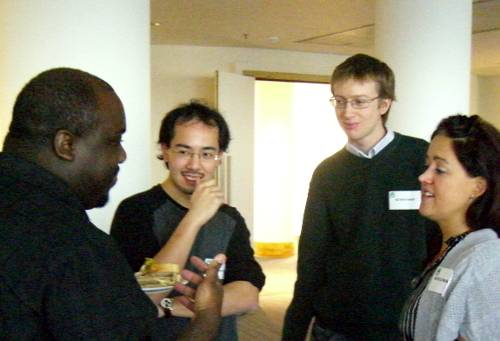I wail moan and cuss about the challenges and fun to be found here.
These are my personal opinions, and not those of my employer. Or anyone else here for that matter.
Tuesday, February 24, 2009
Archive Projects 'Flocking'- Timelines for All?
In the last week I've seen several completely unrelated demos and discussions of projects that seek to present harmonious, integrated and user friendly interfaces to a wide range of disparate archive assets, and what is striking is the congruence of 'vision' of the user proposition. Timelines! It's all about timelines!
As it goes the BBC has some pretty groovy timelines in service, but by and large these are exquisitly hand crafted pieces of digital interactive animation. The next generation of tools are going to have to give that same slick and accessible interface, but to widely heterogenous assets, sometimes from widely different sources! A timeline of the the next generation will need to provide access, meaningful access, to resources from across a broad federated archive, and include all manner of objects, including text, images, video and even 3d models for manipulation and exploration.
Within the BBC this is beginning to stretch beyond the relatively simple domain of linking web resources, into exploring how we can make the broad sweep of our online offering 'time taggable'. We are also contributing to JISC funded projects exploring how assets from us can be combined with others from archies, libraries and academic collections across the UK can be combined. This project is not universally welcomed- there have been objections to the threat of the BBC archive overwhelming other collections. We recognise these concerns and our current efforts in partnerships are very much focussed on bringing benefit to our fellow partners, and avoiding crowding out others. For one thing, we hope to help pioneer tools and technologies that will be then available to smaller archives for lower cost, because we and other 'big hitters' a
have made the initial research investment for the benefit of all.
For myself I do love a good timeline, but I do fear that the smoothness and accesibility of a graphical user interface is often at the expense of it's flexibility and power. Having said that- Gapminder demonstrates that power, flexibiliuty and beauty can be found together, if a clear idea of the user is maintained.
One last link: check out this Smashing magazine review of top graphical interface examples for Gapminder, BBC History and many more.
Sunday, February 22, 2009
beebcamp2
Last week saw the second Beebcamp held at Whitecity. Top kudos to Philip and all the organisers, and many thanks to all the invited contributors who came in and really added to the event.
For me one of the best things was bouncing the BBC Micro for the 21st Century ideas off a new crowd- there are at least two good leads now, outside of the BBC, for me to explore further, in addition to the existing ones.
And in other news, I got the promotion I was going for- Still not entirely sure of a start date (so much still to do on Avatar, including Vegas!), but I hope to soon in in the saddle so recently vacated by Matt Cashmore!
Saturday, February 07, 2009
Where Steam Punk was Born
The I Mech E as it is usually called sits at the bottom southwest corner of St James Park, at 1, Birdcage Walk. A nice spot, tucked in behind the Foriegn and Commonwealth Office, very desirable. And our meeting was in the Whittle Room. The Frank Whittle room, Frank Whittle inventor of the jet engine and total engineering hero, and this room was absolutely stuffed with Whittle memorabilia- it was fantastic (and ever so slightly distracting when the gentleman from Brussels was explaining the finer points of the managment of conflicts of interest in proposal assesment schemes).
So that was completely brilliant, and then, on the way out, I notice that the hallway was lined (literally lined floor to cieling) with working model tractions engines. Working in as much as they could work if you fuelled them up etc- they were sitting in glass cases that day. All well and good you say, but this was to traction engines what the Natural History Museum is to bugs- this was the most incredible collection of the freaky, funky and downright weird traction engines that ever were. This then, in the heart of London, is clearly the true home of the Steam Punk ethic- the sanctum sanctorum of engineering mastery, the motherload of victorian gentle-person design and makery, and they know it!
Friday, February 06, 2009
Maker Faire Newcastle 2009- Update
More to follow (maybe even a URL to the project!)
Tuesday, February 03, 2009
Snow Day!
Quite a few people have blogged about the BBC's central role for our audiences during the recent weather events,but you might like an insight into the way the corporation as a whole coped. Whilst you'd be absolutely right that our public facing infrastructure held up magnificently (offering travel info when so many train companies web sites gave up the ghost), some of our internal business support systems weren't so fortunate.
Perhaps it's obvious, since I made this spectacular snowman yesterday, but our ability to allow staff to work from home all came to a juddering halt around 9.15 yesterday when the majority of the staff in the south east tried to log in from home. I shan't go into the details of the whys and wherefores- it'll take a while to figure those out, and much of it will remain 'private' to the BBC, and rightly so. What's particularly interesting from my point of view is that there were so many other ways to get on with work. Twitter, Gmail and especially Yammer provided a vital channel for us to coordinate efforts and continue work.
Whilst it is critical that the BBC retains control of the excellent audience facing infrastructure that lets us continue with our Television, Radio, Web and other IP based services throughout the most trying of challenges, when it comes to the 'non-broadcast critical' bits and bobs that keep the office going, I'm wondering if we may look more to the cloud and to distributed and open systems to provide, if not the core functionality, then at least a managed backup.
The BBC does have to be careful about it's cyber security- we are, in the eyes of many, a 'valid target'. It's shocking the number of people who see us as an arm of the UK government, even in the UK! Sensitive data, critical communications, the whole of the broadcast chain is, and should remain a well protected central spine of the business. However, we've recently been debating the use of Yammer, and whether we'd be better to run our own Laconi.ca servers internally for the same function. I think we've just had one good illustration of why that might not be such a great idea.
After all, those Darpa guys did have resilience at the top of their wish list all those years ago,

